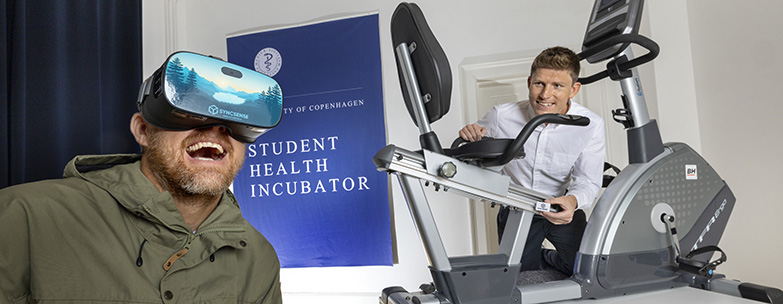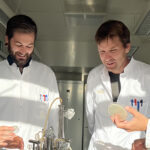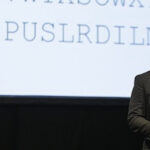Student start-up found vital input in innovation eco-system
Simon Bruntse’s first start-up failed… But the way it failed made him feel like a winner. Like many other student entrepreneurs in Copenhagen Science City, he took his first student-start-up steps at SUND Hub, a community for health-and-care start-ups rooted at University of Copenhagen. The many things he learnt there, prepared him for founding his second start-up, Syncsense, and this one looks like it might go all the way. By Jes Andersen.
Using Virtual Reality to make movement fun for seniors
Bruntse founded Syncsense together with study-mate Steen Petersen. Their company is going to market with Virtual Reality tools that motivate senior citizens to exercise. VR-glasses show beautiful scenery, but only when the user activates the gym equipment. This idea resonated deeply with doctors and other rehabilitation experts. Unfortunately, none of these will buy a product until they see evidence of its efficacy. Evidence the start-up was fortunate to collect right next door in the innovation district.
For us, it was vital that we found partners just next door. Even the price of a bus-ticket could have broken the company at some stages. We found almost all the capabilities we needed within the 800-meter radius of Copenhagen Science City”: Simon Bruntse Andersen, CEO, Syncsense.
Using students to validate and professor to design and develop
During their research-and development phase Syncsence collaborated with nursing and rehabilitation-students at the University College Copenhagen to test user-experience. With University of Copenhagen computer science and health-informatics students to observe and adjust operational procedures and with professors at both institutions to design clinical studies and to develop artificial intelligence-based parts of their system.
University College Copenhagen has a really cool platform for matching companies to students, so we designed a great deal of our validation as student projects for these as well as for University of Copenhagen-students. The feedback we got from our student collaborators has been incredibly valuable. Of even greater value is the fact that these students are recognized by our customers as independent and reliable, because at the end of the day, they have had to present their findings as theses at their places of education:” Simon Bruntse Andersen, CEO, Syncsense.
Learning (very much) by doing
The start-up journey has been an education for Bruntse. Much more so, than the formal entrepreneurship courses he has taken at universities in Denmark and abroad. He found especial value in the offerings of SUND Hub, where he is now “Entrepreneur in Residence”. Most importantly because SUND Hub staff poses one central question to every start-up that crosses its threshold. “What problem are you trying to solve?”
If your start-up is not trying to solve a crystal-clear problem, you might as well close up shop. The business developers at SUND Hub have had an incredible ability to instil that approach in the entire community. And then they have invited all kinds of interesting people, who turned out to be valuable connections for us. Our co-location at SUND Hub has truly showered us with opportunity”: Simon Bruntse Andersen, CEO, Syncsense.
Proof of business
Barely three years after first hatching their idea, Syncsence now has agreements with 11 hospitals and 11 municipal authorities. It has grown from two co-founders to six staff and expects even greater growth in the near future. The company has no immediate plans to leave Copenhagen Science City in order to scale.
An innovation district in the heart of Copenhagen
Copenhagen Science City is an innovation district in the heart of the Danish capital. It is home to University of Copenhagen, University Hospital Rigshospitalet and University College Copenhagen. With 40,000 researchers, students and staff, 450 deep-tech start-ups and nine incubator- and accelerator programmes it is “Possibly the best place in Europe to launch or scale your innovation based business”.




